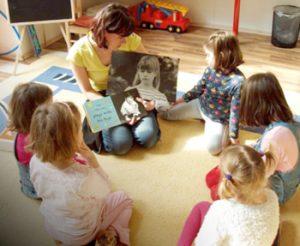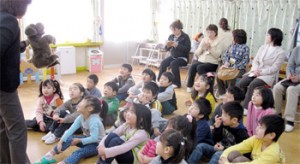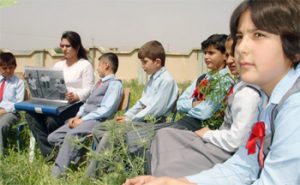Welcome to the March 2012 issue of the Global Washington newsletter. If you would like to contact us directly, please email us.
IN THIS ISSUE
- Note from our Executive Director
- Featured Organization: Committee for Children: Taking Steps to Bring Social and Emotional Health to Children Around the World
- Changemaker: Bill Taylor “All the Good You Can Do” for Children in Southeast Asia
- Welcome New Members
- Announcements
- Upcoming Events
Note from our Executive Director
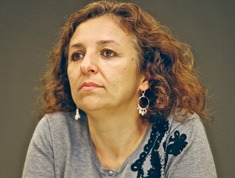 I hope you are all enjoying the beginning of spring!
I hope you are all enjoying the beginning of spring!
The highlight of March for us was an event called “How Girls Can Save the World,” featuring women’s advocate and award-winning actor Geena Davis; Christine Grumm of the Chris Grumm Consulting Group; and Andrea Taylor, Director for North America Community Affairs at Microsoft. We were thrilled by your response and interest! Investing in women and girls is crucial to the future health of our communities, both globally and locally. Over 800 people signed up for this event, which turned out to be a lively conversation about gender portrayals in the media, feminism, and women’s issues in global development. If you missed the talk, an audio recording is available online.
This event was the first in a new series for us called GlobalWA // Gather, in which we will bring global development thought-leaders to town for lively conversations about some of our world’s most pressing issues. I hope you will be able to join us for more events in this series!
Spring is about new beginnings; we have just launched our annual membership satisfaction survey to help us begin this season well by effectively serving our members and the community. If you are a Global Washington member, you should have received this survey in your email last week—we very much hope you will fill it out! Your satisfaction is important to us and your feedback is invaluable as we plan our work.
And speaking of beginnings—if you have not yet joined Global Washington as a member, now might be the time to do it! We expect to bring you many high-caliber events this year, and often have discounts or early registration for members. We also offer several newer member resources like our careers in development centerand online giving platform.
Finally, we expect this to be a big year for spotlighting our members’ work through special promotional opportunities! If you would like to find out more about membership or any of these resources, please contact our Office Manager, Megan Boucher at megan@globalwa.org and she will assist you.
Best wishes for enjoying the return of the warmer weather and the sunshine!
In unity,
![]()
Bookda Gheisar, Executive Director
Featured Organization
Committee for Children: Taking Steps to Bring Social and Emotional Health to Children Around the World
By Carolyn Hubbard
When a country’s president shows up at your conference to praise your program, you know you’re doing something right. Such was the case at Committee for Children’s International Consortium, when Lithuania’s president, Valdas Adamkus, praised the Committee’s violence prevention program for helping Lithuania’s high-risk kids.
Committee for Children (CFC) is a leading provider of curricula and trainings focused on strengthening children’s social and emotional health. Subjects for kids from preschool through middle school range from bullying prevention and personal safety to emotion management and empathy. Once a local volunteer-powered start-up, CFC is now a dynamic social entrepreneurship with partners around the world and the goal to bring their evidence-based programs to more children the world over.
CFC’s origins are the result of research studies conducted by Drs. Jennifer James and Debra Boyer that showed that most youth involved in prostitution had been victims of at-home sexual abuse. With the goal to curb this trend and give children the necessary skills to prevent sexual abuse, the pair founded the group Judicial Advocates for Women, garnered some funding, borrowed some office space and developed the Talking About Touching program to teach children about personal safety and self-assertion. Before they could even think about marketing their product, organizations and schools were calling and asking for more. CFC delivered, and later developed their Second Step and Steps to Respect programs focused on social and emotional health and bullying prevention. Soon, they were getting calls not just from other states but from other countries as well.
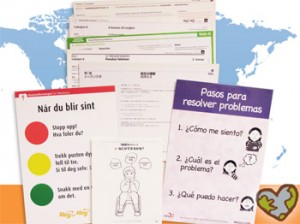 There’s a reason for this success: the programs work. Executive Director Joan Cole Duffell explains that since day one they have developed programs from sound pedagogical and psychological research and practice. Not only that, the programs are evaluated and fine-tuned until there is, as Duffell says, “a nexus between rigorous research and simplicity of use. That sweet spot between the two is what brings the success.”
There’s a reason for this success: the programs work. Executive Director Joan Cole Duffell explains that since day one they have developed programs from sound pedagogical and psychological research and practice. Not only that, the programs are evaluated and fine-tuned until there is, as Duffell says, “a nexus between rigorous research and simplicity of use. That sweet spot between the two is what brings the success.”
Today, the programs are taught in over seventy countries, including Lithuania, a country burdened with the highest teen suicide rate in the world. CFC’s pilot program there showed that the most at-risk kids made the strongest gains in self-respect and emotional growth through the lessons. President Adamkus sang the program’s praises with good reason.
Committee for Children’s international success has taken the organization into a whole new playing field. At first, they simply licensed the use of the programs to interested parties, an easy step that brought in a bit of revenue for the quickly growing organization. “We had a light touch with international partners,” explains Duffell. Despite the light touch, the organization still oversaw all translations and cultural adaptations of the materials. Changes could be made to meet cultural needs (change a photo here, a scenario there), but as International Partnership Manager Paige Mac Leod notes, the core lessons required little change across cultures.
Most of the schools and organizations interested in using the programs were in countries with a culture of purchasing classroom curricula, i.e. more developed countries, such as Scandinavian nations, Japan, Australia, Germany. They are also places that can readily access CFC’s online trainings and have the resources to pay for and produce the products. (Note that these programs are a far cry from a typical textbook. Program packages come with puppets, DVDs and large colorful laminated lesson cards, as well as teacher reference binders—plus an online activation key that gives teachers a robust array of digital tools.) Partnering with curriculum providers in these countries became CFC’s main focus as they built their international presence. Taking success a notch higher, the governments of Greenland and the Philippines adopted programs, mandating that they be taught in all of the schools of their respective countries.
Now, as less-developed nations seek out access to the programs, CFC is intentionally looking for partners with whom they can strategize program implementation, in light of production costs, limited online access, and more intricate cultural nuances. They already have fledgling partnerships in Colombia and are forging a partnership with Escuela Nueva, a non-governmental organization dedicated to improving the quality of basic education in developing countries. MacLeod explains that they are looking at both urbanized and rural/marginalized settings in resource-poor countries to determine what each setting needs and how to best fill those needs. Their first pilot project in a rural setting will be with the Anglican Diocese in the Upper Shire region of southern Malawi, an area where Duffell and her family regularly visit and volunteer. Other countries in which they are building a presence include El Salvador, Chile, Singapore, Turkey and the Kurdish region of Iraq.
There’s a hitch to all of this growth and interest: how to fund it. While program sales are robust each year, that revenue just covers CFC’s annual costs. There is little extra revenue to support meeting the demand of countries that simply can’t pay for the programs in their current structure. For the first time since their grassroots days, CFC is building relationships with funders and looking at innovative partnership models to find ways to bring their programs to more of the world’s children. With social and emotional health part and parcel of a child’s health and development, opportunities are bound to emerge.
“We are thrilled Global Washington exists,” Duffell remarks. “It really is a great benefit. When you bring people together that have similar goals to reach out to people, you are going to make magic happen.” She has met with other Global WA members to look at partnerships and to learn strategies, including PATH, whose approach of using the country’s strengths and unique cultural qualities to introduce programs, rather than assume a U.S cultural model is a great example for Duffell. “PATH has done that so brilliantly, so elegantly,” she notes.
As Mac Leod strengthens CFC’s international presence, work continues throughout the organization to develop more programs to help vulnerable kids in the States. The Raynier Foundation granted the organization over $500,000 for a landmark evaluation study of Steps to Respect, CFC’s bullying prevention program, and the Raikes Foundation awarded the organization a $250,000 three-year grant to develop online training tools for Second Step in collaboration with three Washington State middle schools with at-risk (of substance abuse, bullying, peer pressure) populations. Recent research from the Collaborative for Academic, Social, and Emotional Learning (CASEL) showed that the use of intervention programs such as these increases students’ academic achievement. As the debate about how to improve schools continues to rage across the country, this study is sure to bring more attention to Committee for Children.
In April of 2013, CFC will host its biannual international partner’s conference in Seattle. Accolades are sure to be given, strategies developed, and reports of children’s improved emotional well-being broadcast. Chances are a few more extra chairs will need to be at the table for people, maybe even heads of state, to stop by and sing Committee for Children’s praises.
Changemaker: Bill Taylor
“All the Good You Can Do” for Children in Southeast Asia
By Megan Boucher
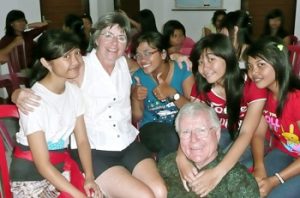 Bill Taylor is quick to point out that his work is all about how ordinary people with ordinary resources can make a difference. The Bill & Pat Bali Fund and the SE Asia Children’s Foundation, two initiatives started by Bill and his wife Pat, connect sponsors to children (especially girls) in Southeast Asia with a mission to break the cycle of poverty by educating children and making sure girls have an opportunity to succeed. Bill’s journey started in an ordinary way: with a vacation and then a simple gift from his wife.
Bill Taylor is quick to point out that his work is all about how ordinary people with ordinary resources can make a difference. The Bill & Pat Bali Fund and the SE Asia Children’s Foundation, two initiatives started by Bill and his wife Pat, connect sponsors to children (especially girls) in Southeast Asia with a mission to break the cycle of poverty by educating children and making sure girls have an opportunity to succeed. Bill’s journey started in an ordinary way: with a vacation and then a simple gift from his wife.
When asked why he began this work, Bill laughed and said “we just showed up! It’s what the universe decided.” He and Pat went to Bali, Indonesia for a holiday in 2005 and sponsored a few girls at a local orphanage because it seemed like a nice gesture. “We dabbled with it for the first several years,” Bill recalled. They met the girls and fell in love with them. After finding out that many didn’t have sponsors, they took it upon themselves to get their friends involved. The first year they found eight sponsors. The next year, fifteen. Of these humble beginnings, Bill said “we would write checks, we’d go visit, but it was still a holiday.” Then one day Pat gave Bill an oval river rock about 5 inches long for his birthday. Engraved on it were the words, “you cannot do all the good the world needs, but the world needs all the good you can do.” That rock touched Bill and made him realize that he was not doing nearly all the work that could be done! He started asking himself what they could really do with the resources that they had. The work escalated from there.
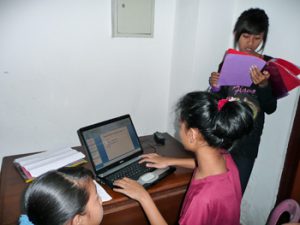 The Bill & Pat Bali Fund is a self-directed fund within Give2Asia (a San Francisco-based nonprofit). Bill and Pat cover the administrative expenses themselves so that every dollar donated goes to the Widhya Asih Foundation, an organization that supports seven children’s homes in Indonesia. Though the word for the children’s home translates as “orphanage,” most of these kids are not orphans—their parent or parents are simply too poor to send them to school. If a family can afford to educate only one child, it is usually the oldest boy, so girls are often left behind. Sponsorship through the Bill & Pat Bali fund helps pay for food, a safe place to live, and school fees for the girls. Bill calls it “an environment of achievement,” giving young women a chance for a life that they wouldn’t otherwise have.
The Bill & Pat Bali Fund is a self-directed fund within Give2Asia (a San Francisco-based nonprofit). Bill and Pat cover the administrative expenses themselves so that every dollar donated goes to the Widhya Asih Foundation, an organization that supports seven children’s homes in Indonesia. Though the word for the children’s home translates as “orphanage,” most of these kids are not orphans—their parent or parents are simply too poor to send them to school. If a family can afford to educate only one child, it is usually the oldest boy, so girls are often left behind. Sponsorship through the Bill & Pat Bali fund helps pay for food, a safe place to live, and school fees for the girls. Bill calls it “an environment of achievement,” giving young women a chance for a life that they wouldn’t otherwise have.
Bill and the staff are clear on what success for these children means and careful to measure their progress. To be considered a full success a girl stays at the orphanage, finishes and passes high school, passes her national exams, and obtains self-sustaining employment. “Anything short of that is a failure,” Bill said emphatically. This work is not simply about helping these girls get by—it is breaking the cycle of poverty so that they and their future families will all have a better life. In order to achieve this, they involve the girls, parents, and sponsors in the process.
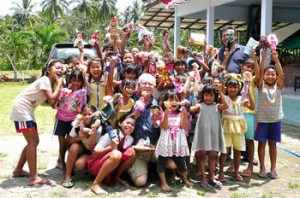 “We’re not wealthy,” Bill insisted. “But we have a little money, and talents, and friends.” He puts all of these resources to good use in his work with the fund and the foundation. He has over 40 years of experience as a management consultant, with skills in strategic planning, human resources, and organization development. Though Bill is obviously in favor of donating to a worthy cause, he believes strongly in augmenting that money with coaching and guidance. Any organization that he funds, he also works with to achieve optimal management and sustainability. This personal involvement helps him assure his donors that the funds for Bali are being used effectively. “I know these people personally,” he said. “I know the leaders. I’ve seen their facilities. I’ve looked at their financial records.”
“We’re not wealthy,” Bill insisted. “But we have a little money, and talents, and friends.” He puts all of these resources to good use in his work with the fund and the foundation. He has over 40 years of experience as a management consultant, with skills in strategic planning, human resources, and organization development. Though Bill is obviously in favor of donating to a worthy cause, he believes strongly in augmenting that money with coaching and guidance. Any organization that he funds, he also works with to achieve optimal management and sustainability. This personal involvement helps him assure his donors that the funds for Bali are being used effectively. “I know these people personally,” he said. “I know the leaders. I’ve seen their facilities. I’ve looked at their financial records.”
Unlike some sponsorship organizations, the Bill & Pat Bali Fund facilitates active and strong connections between sponsors and the girls they are sponsoring. Sponsors commit to supporting their girls through high school. And it is not merely about the money. “We believe strongly that it really matters to that girl to know that somebody some place in the world loves her and cares about her and encourages her to study hard and make something of her life,” said Bill. He travels to Indonesia himself 4 times a year and is happy to carry cards, letters, and small amounts of money from the sponsors to the girls, although he knows that this will probably not be scalable as the work expands. The kids have access to technology (facebook and email) and are able to communicate with their sponsors. Feedback from sponsors indicates that this personal relationship is meaningful for them as well.
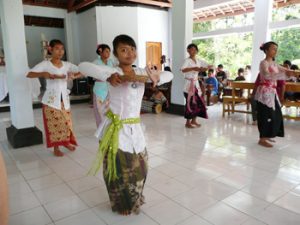 Bill’s newest project is called the SE Asia Children’s Foundation and will be a big expansion of the work to fund orphanages in Thailand. He has been visiting different organizations to find the best partners. He described a visit to one home in northern Thailand where a picture of one rice bag and a few pumpkins stuck out in his mind. That was all that the children had to eat at the time—they weren’t even receiving 3 meals a day. “We can’t let that happen,” Bill said. “We just can’t.”
Bill’s newest project is called the SE Asia Children’s Foundation and will be a big expansion of the work to fund orphanages in Thailand. He has been visiting different organizations to find the best partners. He described a visit to one home in northern Thailand where a picture of one rice bag and a few pumpkins stuck out in his mind. That was all that the children had to eat at the time—they weren’t even receiving 3 meals a day. “We can’t let that happen,” Bill said. “We just can’t.”
Purchasing food is a simple, inexpensive, and effective way to help. Bill is encouraged and encourages donors with the fact that even small changes can make a significant difference. When asked about his biggest accomplishment, Bill said “just the fact that we’re doing it! We’re having a profound impact on the lives of many kids.” They currently have sponsorships for around 140 girls but also support 400 children in the orphanage as a whole through other major projects like a vocational training center, a bus, a new dormitory, a well, water purification, and a new information system.
Bill commented that many things happening in the world are overwhelming to try and change. However, the theme of Bill’s work is that ordinary people can find a way to make a difference if they find the right cause and use their resources effectively.“And these changes will ripple for generations,” he emphasized. “The bottom line is to connect with something where you can actually make a difference in the world.” And then, as Bill and Pat have done, just go out and do it!
Welcome New Members
Welcome new members!
Please welcome our newest Global Washington members. Take a moment to familiarize yourself with their work and think of opportunities for support and collaboration!
Port Townsend Film Institute: We want to tend the most valuable resource we have, the fertile ground of imagination right here at home. We believe that a shared cinematic experience of creating and viewing film can strengthen our community and expand our shared humanity. www.ptfilmfest.com
Office of the Superindent of Public Instruction (OSPI) is the primary agency charged with overseeing K-12 public education in Washington State. Led by State School Superintendent Randy Dorn, OSPI works with the state’s 295 school districts to administer basic education programs and implement education reform on behalf of more than one million public school students. http://www.k12.wa.us/
The Village Pig Project: The Village Pig Project supports a free and self-sufficient people in rural Cambodian villages by helping families to create self-sustaining pig farms. http://www.villagepigproject.org/
Announcements
Engineers Without Borders hosts annual fundraising dinner
Engineers Without Borders is hosting “Building Across Borders 2012,” the third annual fundraising event to support their Puget Sound Chapters. The event—featuring dinner, interactive project demonstrations, and a live auction—will take place on April 23rd at Seattle University’s Campion Ballroom. The organization is currently seeking auction donations, table captains and volunteers, and sponsors (email fundraising@ewb-pugetsound.org for more details about sponsorship). Early bird tickets to the event are available until March 31st!
Engineers Without Borders USA (EWB-USA) is a nonprofit humanitarian organization that supports community-driven development programs through partnerships that design and implement sustainable engineering projects around the world.
For more information, visit http://ewb-pugetsound.org/BAB2012
Nonprofit political activities presentation
“Nonprofits in an Election Year: Understanding the lines between advocacy, lobbying and political activities,” a presentation by Riddell Williams and the Alford Group, will help nonprofits learn how to safely lobby or advocate for issues they care about. They will also learn how to navigate some of the rules relating to nonprofit political activity.
This breakfast briefing is free and will start at 7:00am on April 11th at 1001 4th Avenue, Suite 4500. Reserve your space by April 4th by calling Kim Tran at 206.389.1710 or emailing ktran@riddellwilliams.com.
World Bicycle Relief’s 100,000th bicycle and new partnership with Theo Chocolate
Since 2005, World Bicycle Relief (WBR) has provided 100,000 bicycles in Asia and Africa. Their bicycles are locally assembled; made for rugged terrain; and utilized by a variety of individuals from students, to healthcare workers, to entrepreneurs.
The organization started as a disaster relief operation in Sri Lanka following the 2004 tsunami and has since expanded to many more countries. Congratulations to WBR for this milestone and for your continued, innovative work of changing lives through bicycles!
Another exciting new project for WBR is a special partnership with Theo Chocolate, which has announced a new “Theo/World Bicycle Relief Sea Salt 70% Dark Chocolate” chocolate bar. A percentage of the bar’s $4.99 price goes to support WBR’s bicycle programs for students in Africa.
Seattle-based Theo Chocolate is known as a socially responsible company, selling delicious organic, fair trade chocolate. The partnership was a natural fit as both Theo and WBR support sustainable livelihoods for people in developing nations. Buy the new chocolate bar at www.theochocolate.com.
Seattle International Foundation Announces Call for Applications under its 2012 Global Program
The Seattle International Foundation (SIF) is accepting applications under its Global Program beginning April 1st. The Global Program (small grants for local organizations) supports and fosters local organizations working internationally. SIF is interested in development projects in all regions of the world.
The Global Program is open to 501(c)3 organizations, or those with fiscal sponsorship, with an annual organizational or project budget of less than $2 million (USD). Preference will be given to organizations based in the greater Puget Sound region; organizations based outside of Washington State are not eligible. The program seeks to support organizations launching new projects, or working to establish or expand an international project or program.
For more information on how to apply, please visit www.seaif.org, or contact Michele Frix (Program Officer) at mfrix@seaif.org.
New GAPPS Repository will help scientists improve maternal and child health
This month the Global Alliance to Prevent Prematurity and Stillbirth (GAPPS) opened a first-of-its-kind biorepository of pregnancy specimens, which combines biospecimens from pregnancies worldwide (e.g. placenta tissue and blood) with data about the mother (e.g. pregnancy history and nutrition) to provide scientists the comprehensive information they need to learn how women can have healthier pregnancies.
The repository currently has over 8,000 individual specimens from women of all different backgrounds, with more specimens continually added. Scientists can request specimens from www.gapps.org/repository or gappsrepository@seattlechildrens.org.
Imaging the World advances project in Uganda
Imaging the World combines ultrasound technology with training to provide medical imaging to rural populations who previously lacked access this technology. Through innovative data transmission systems, ITW allows local health care providers to make life-saving diagnoses even in the poorest, least accessible regions of the world. ITW recently celebrated “phase 2” their project at the Nawanyago Health Center in Uganda. Local nurse Sister Angela Njeri has completed an 8-week training course in ultrasound technology, an important step for the sustainability and quality of the program in Nawanyago. For the full story, visit http://imagingtheworld.org/2012/03/nawanyago-health-center-advances-to-phase-2/
9th Annual Western Regional International Health Conference focuses on “hidden paths”
UW students have organized a fantastic lineup of speakers and programs for “At a Crossroads: Choosing Hidden Paths in Global Health,” the 9th Annual Western Regional International Health Conference. This year’s conference will take place from April 27 to 29 and the keynote speaker will be human rights advocate Kavita Ramdas, Executive Director for a new program on social entrepreneurship at Stanford University.
This weekend-long conference will feature 18 breakout sessions with top leaders, centered around topics like global mental health, marginalized populations, organizing and funding of global health, clinical issues in global health, communications and technology in global health, and the environment and global health.
Registration is $50 for students and $100 for community members. For more information or to register, visit www.wrihc.org.
2012 Challenge Accepted Conference
“The largest youth conference on U.S. foreign policy in 2012” will take place in Washington, D.C. from April 14-15. Challenge Accepted will help young people discuss key problems and issues facing their generation from economics to world hunger. For more information or to register, visit www.acceptthechallenge2012.org.
PATH announces Steve Davis as new CEO
PATH recently named Steve Davis as its new president and CEO. Davis has extensive industry and leadership experience. He was most recently the global director of social innovation at McKinsey & Company. Prior to that, he served as CEO of Corbis, interim CEO of the Infectious Disease Research institute, and interim Director of PATH’s India program. He has also served as a board member for many prominent organizations including PATH, Fred Hutchinson Cancer Research Center, and Global Partnerships. PATH’s former CEO, Christopher Elias, started a new position in January as president of the Global Development Program at the Bill & Melinda Gates Foundation.
NGO Roundtable Meeting with Representative Adam Smith
Don’t miss an upcoming opportunity to meet with congressional representative Adam Smith. Congressman Smith is holding a roundtable for NGOs on Friday, April 13th at the Burien Communtiy Center.
Date: Friday, April 13, 2012
Time: 12pm-1pm – Networking | 1pm- 2pm – Meeting
Location: Burien Community Center, Manhattan Room
14700 6th Ave. SW
Burien, WA 98166
Contact or RSVP to: Linh Thai, linh.thai@mail.house.gov or 253-272-1488
Special Screening of Bonsai People on April 18th
Lumana, Washington Micro, and Fortunato Vega for a special screening of, Bonsai People, a documentary about the vision of Muhammad Yunus and his work in microcredit and social business. This event will take place on April 18th at 5:30pm at the University of Washington’s Kane Hall and will also include a wine and cheese reception. For more information or to RSVP, visit http://bonsaipeopleseattle-esearch.eventbrite.com/?srnk=1.
World Affairs Council presents talk on “Diseases Without Borders”
On April 3rd, the World Affairs Council will host a talk with Dr. Nils Daulaire, Director of the Office of Global Affairs at the U.S. Department of Health and Human Services. Dr. King Holmes, Chair of the Department of Global Health at the University of Washington will moderate a talk on “Diseases without Borders: How Global Health Issues Impact Domestic Health Policy.”
It will take place at 6:00pm at The Broadway Performance Hall in Seattle and will cost $10 for students and WAC members and $15 for non-members.
For tickets or more information, visit: http://www.world-affairs.org/events/2012/04/03/global-health-priorities.
GiveBIG is a one-day giving event for nonprofit organizations in the area, organized by The Seattle Foundation. TSF will match a percentage of funds donated through their website on May 2nd. TSF is offering a special GiveBIG training workshop to Global Washington members, that will provide technical assistance and help participants develop a fundraising strategy for the campaign. Participating organizations will have a chance to sign up for one-on-one support and all will receive a planning checklist and other resources. Global Washington members, please watch for a separate email with more details!
For more information about GiveBIG, visit TSF’s GiveBIG webpage.
Upcoming Events
Thursday, March 29
How Co-Operative Businesses Build a Better World. Oikocredit, BECU and PCC.
Friday, March 30
Cooperatives and Ethical Finance, a reception for faith and economic justice leaders
Saturday, April 7
The Future of Asia’s Cities lecture series. “Asian Urbanism: Negotiating the Global”
Saturday, April 21 – Sunday April 22
Global Health & Innovation Conference 2012
Monday, April 23
Building Across Borders
Friday, April 27 – Sunday April 29
9th Annual Western Regional International Health Conference
Saturday, April 28
PERSPECTIVES IN ENVIRONMENT & CULTURE: Sustaining Biodiversity
Monday, April 30
PERSPECTIVES IN ENVIRONMENT & CULTURE: Sustaining Biodiversity
Thursday, May 24 – Monday May 28
2012 Basoga Twegaite Convention-Diaspora Ugandans, Friends and Wellwishers Opportunity to Contribute to improving Global Health
